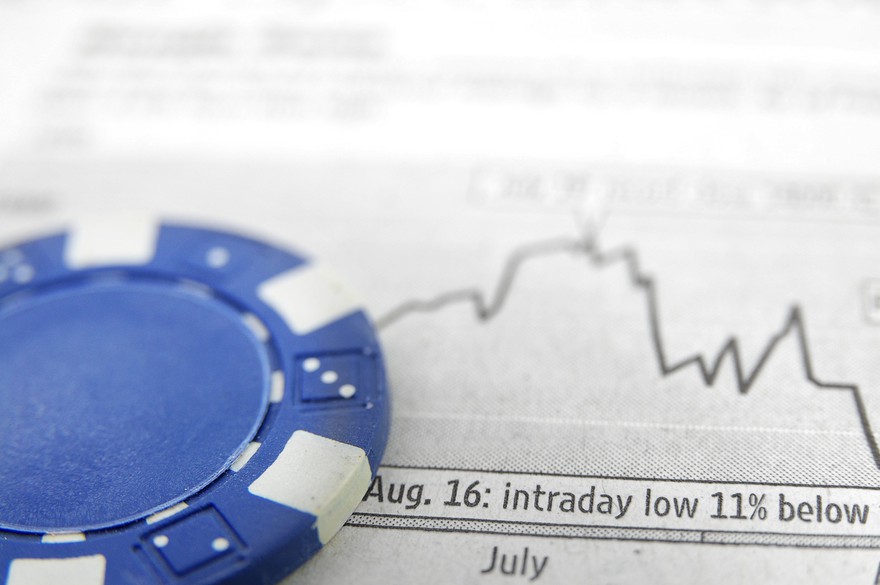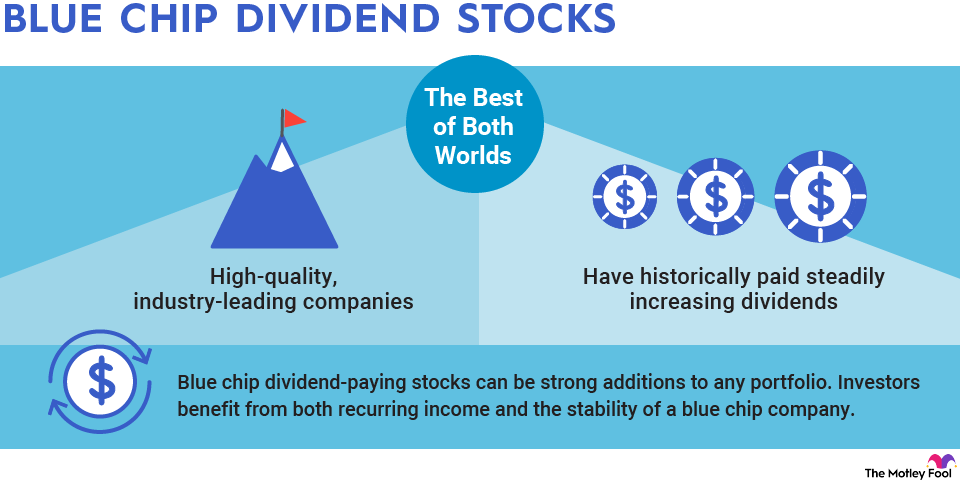Blue chip stocks are the stocks of well-known, high-quality companies that are industry leaders. These companies have stood the test of time and are respected by their customers and shareholders. Blue chip companies have solid business models and impressive records of returns for investors. These returns often include regular and growing dividend payments.

Blue chip stocks' attractive risk-reward profiles make them among the most popular for conservative investors. However, even more risk-tolerant investors should consider buying blue chip stocks to diversify their portfolios and provide stability during turbulent stock market conditions.
What is a blue chip stock?
So, what are they? A blue chip stock is defined as a security that represents an equity position in a company that meets most of the following criteria:
- It's an industry leader with a dependable business model.
- It has a large market capitalization.
- The underlying business has demonstrated resilience during economic downturns.
- It has inclusion in major stock market indexes.
- It has a strong reputation with consumers and shareholders.
- It has a history of delivering strong returns over the long term.
- It pays dividends to shareholders and makes regular increases to its payouts.
How do blue chip stocks work?
Like other stocks, blue chip stocks grant their owners a position in the underlying company. The difference between blue chip stocks and other stocks is that blue chip companies have long histories of delivering strong results and reputations for performing at the top of their respective industries.
In most cases, blue chip stocks also pay dividends -- which means that shareholders can receive regular cash checks simply for owning shares. As with other stocks, the performance of blue chip stocks tends to correlate with their earnings results over the long term.
If a blue chip company lives up to or exceeds earnings expectations, it likely has a good chance of delivering solid returns for its shareholders. Blue chip companies have typically been able to grow into large market capitalizations and build long track records of dividend payouts and payout growth thanks to strong earnings performance.

Best blue chip stocks to buy right now
Even if you've never invested in the stock market, you'll recognize the names of many top blue chip stocks. These large-cap companies provide products and services that billions of people worldwide use daily. Here are five of the best blue chip companies on the market:
| Blue chip company | Market cap | Dividend yield | Industry |
|---|---|---|---|
| Apple (NASDAQ:AAPL) | $4.1 trillion | 0.37% | Technology Hardware, Storage and Peripherals |
| Berkshire Hathaway (NYSE:BRK.A) | $1.1 trillion | 0.00% | Diversified Financial Services |
| Coca-Cola (NYSE:KO) | $332.7 billion | 2.64% | Beverages |
| Johnson & Johnson (NYSE:JNJ) | $564.9 billion | 2.19% | Pharmaceuticals |
| American Express (NYSE:AXP) | $243.6 billion | 0.93% | Consumer Finance |
1. Apple
Apple (AAPL -0.86%) is one of the world's most profitable companies. Throughout its history, it has pioneered advancements in the technology sector.

NASDAQ: AAPL
Key Data Points
The company innovated with its Macintosh computers in the 1980s and made media portable with its iPods in the early 2000s. Its iPhones, iPads, and Apple Watches are ubiquitous today. In a world where consumers flock to the latest tech fads, Apple's products enjoy notable loyalty from its customer base.
Apple also earns recurring revenue through its services, which include iTunes, the App Store, and its streaming television businesses. In 2018, Apple's market capitalization climbed past the $1 trillion mark to an unprecedented $2 trillion in 2020. The tech giant then became the first company to reach a $3 trillion market cap. Its valuation marched even higher from there, surpassing $4 trillion in late 2025.
While the company's valuation has sometimes fluctuated in conjunction with volatility in the broader market and business-specific developments, the tech giant's stock has been an excellent performer for long-term investors. Apple has been among the largest public companies for a long time, and the business still has room for growth over the long term.
2. Berkshire Hathaway
Berkshire Hathaway (BRK.A -0.82%)(BRK.B -0.31%) is a major player in the insurance industry. Through its subsidiaries, GEICO and Gen Re, Berkshire offers various lines of commercial and personal insurance. However, Berkshire also owns a diverse set of businesses.

NYSE: BRK.A
Key Data Points
For example, Berkshire owns restaurant chain Dairy Queen, railroad giant BNSF, and utility company Berkshire Hathaway Energy. It also owns water companies, consumer apparel businesses, battery brands, and more.
Beyond its subsidiary businesses, the investment conglomerate owns a large portfolio of publicly traded stocks. With such a broad range of businesses, the company has a reputation for safety, security, and consistent performance.
At the end of 2025, Warren Buffett stepped down as Berkshire's CEO and was replaced by his protege Greg Abel. Berkshire Hathaway is the only blue chip stock on this list that doesn't pay a dividend, but it's possible the company could institute a payout under Abel's leadership.
3. Coca-Cola
Coca-Cola (KO +0.82%) has been a leader in the beverage industry for more than a century, with its namesake soft drink spawning a global empire. Yet, Coca-Cola has also changed with the times and now provides a much broader array of products, including juices, sports drinks, and bottled water tailored for more health-conscious consumers.

NYSE: KO
Key Data Points
Coca-Cola particularly stands out for increasing its dividend. Its streak of consecutive annual dividend payment increases dates back to the early 1960s, a track record that places it among the top 10 dividend stocks on the market.
4. Johnson & Johnson
Johnson & Johnson (JNJ +1.46%) is well-known for its popular consumer products, including baby shampoo, Band-Aids, and Tylenol pain reliever. However, through a stock spinoff completed in May 2023, J&J separated its consumer health products business into Kenvue (KVUE -0.11%), a new company that agreed in November 2025 to be acquired for $48.7 billion by Kimberly-Clark (KHC -0.80%).

NYSE: JNJ
Key Data Points
Even with the spinoff, J&J is a true healthcare giant that makes a wide array of medical devices to help doctors and other medical professionals perform life-saving procedures. Johnson & Johnson also has a vast pharmaceutical business and produces drugs such as the arthritis treatment Remicade, the prostate cancer drug Zytiga, and the psoriasis drug Stelara.
Johnson & Johnson has been restructured around its highly regarded pharmaceuticals and medical devices segments, and these businesses have promising long-term growth outlooks.
5. American Express
Financial giant American Express (AXP +0.11%) is another blue chip stalwart to consider. It's both a credit card company and a payment network. Its main revenue generators are credit card fees and transaction processing fees. With new users and higher transaction volume, the company is poised to increase both revenue streams.

NYSE: AXP
Key Data Points
It's more than 170 years old, but it's staying relevant. The company's cards have surged in popularity among millennials and Gen Z consumers. Those younger age demographics are driving account registrations and accounting for a third of overall spending through the AmEx network.
American Express' management believes it can expand profits at a double-digit pace in the years to come. It plans to pay out roughly a quarter of its profits as shareholder dividends and announced a 17% increase in its dividend in March 2025. Ongoing earnings growth should lead to additional increases in future years.
A bigger list of blue chips
Investors have a sizable number of blue chip stocks to choose from. Here's a list of 20 more:
Investing in blue chip companies
Blue chip stocks are smart choices for investors of all kinds. Beginning investors are likely familiar with the products and services of blue chip companies. Familiarity with a company makes buying shares more comfortable, and it's exciting to become a partial owner of a business you know.
Meanwhile, long-time investors will likely have an understanding of the underlying business performance for various blue chip stocks through the years. This may lend them insights into which companies are positioned to continue thriving.
Investors of all experience levels can appreciate the general stability and reliability that blue chip businesses offer shareholders. Many of these companies pay great dividends and have payout growth streaks that have earned them a spot among the illustrious ranks of the Dividend Kings, companies that have increased their dividends for at least 50 years.
Risks of investing in blue chip stocks
Blue-chip companies have reputations for reliably increasing sales and earnings over the long term and delivering strong returns for shareholders. However, investing in these stocks still comes with risks.
Despite enjoying many competitive advantages, it is still possible for these companies to lose market share to rival players. In some cases, new innovations may completely disrupt the business models of blue chip companies.
Blue chip stocks also tend to enjoy valuation premiums. Investors are often willing to pay more to own these stocks because the underlying companies have demonstrated strong performance and impressive longevity.
If signs emerge that a blue chip company's business is weakening, its stock can fall rapidly because investors become less willing to pay sales and earnings premiums associated with expectations that its competitive advantages will remain intact.
Hands-off investing with blue chip funds
Investors interested in blue chips may also want to consider exchange-traded funds (ETFs) and mutual funds. Blue chip-focused ETFs and mutual funds bundle numerous blue chip stocks into a single security, offering a simple way to diversify across many high-quality stocks and build exposure to industries ranging from technology and hardware to pharmaceuticals and electric utilities.
These investment vehicles also tend to be less volatile than individual stocks, making them particularly appealing to people who are retired or nearing retirement. Blue chip ETFs and mutual funds can also be a good fit for younger investors seeking the defensive advantages of diversification and those without the time to research individual stocks adequately.
Alternatively, blue chip ETFs can offer a narrower concentration of high-quality stocks than an S&P 500-tracking ETF or a Nasdaq-tracking ETF.
How to invest in blue chip stocks
- Open your brokerage app: Log in to your brokerage account where you handle your investments.
- Search for the stock: Enter the ticker or company name into the search bar to bring up the stock's trading page.
- Decide how many shares to buy: Consider your investment goals and how much of your portfolio you want to allocate to this stock.
- Select order type: Choose between a market order to buy at the current price or a limit order to specify the maximum price you're willing to pay.
- Submit your order: Confirm the details and submit your buy order.
- Review your purchase: Check your portfolio to ensure your order was filled as expected and adjust your investment strategy accordingly.
Tips for investing in blue chip stocks
- Measure the company's sales and earnings profile and growth outlook against its market capitalization.
- Prioritize investing in blue-chip companies that have been steadily growing gross margins and operating-income margins.
- Look for companies with proven management teams.
- Macroeconomic trends are difficult to predict, so look for companies that are capable of adapting to inflationary pressures and other dynamics.
- Measure a company's dividend-growth rate against the rate of inflation.
- Consider competitive dynamics that could shape performance in a company's key product and service categories. Blue-chip companies often dominate valuable markets, but they are not immune to disruption.
- Try to back companies that have defensible moats over the long term.
Related investing topics
Blue chips in a well-balanced portfolio
If you're looking for maximum growth in your stock investments, you'll also want to look beyond blue chip stocks at some up-and-coming small-cap stocks of innovative young companies seeking to disrupt their larger rivals. These high-growth upstarts aim to be the blue chip companies of tomorrow.
However, just about every investor can benefit from having a portion of their portfolio invested in blue chip stocks. It doesn't have to be a set percentage; investors will have varying viewpoints about how much risk they want to assume.
But the more you want to preserve and protect the money you have invested in the stock market, the more attractive blue chip stocks will be as you try to meet your objectives and reach your long-term financial goals.




